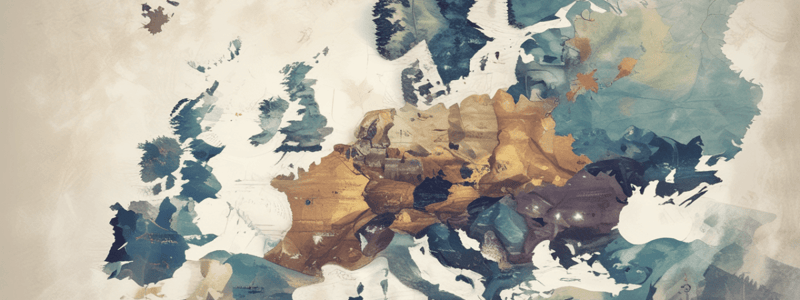Podcast
Questions and Answers
What is the role of the European Council in the EU's law-making process?
What is the role of the European Council in the EU's law-making process?
- To represent the interests of individual member countries
- To implement EU laws
- To set the EU's broad priorities (correct)
- To propose new laws
Which institution represents the EU's citizens in the law-making process?
Which institution represents the EU's citizens in the law-making process?
- The European Commission
- The Council of the European Union
- The European Council
- The European Parliament (correct)
What is the primary role of the European Commission in the law-making process?
What is the primary role of the European Commission in the law-making process?
- To represent the EU's citizens
- To defend national interests
- To propose new laws and ensure their implementation (correct)
- To adopt EU legislation
What is the name of the EU's standard decision-making procedure?
What is the name of the EU's standard decision-making procedure?
What does the European Commission prepare before proposing new initiatives?
What does the European Commission prepare before proposing new initiatives?
How many EU countries are represented in the Council of the European Union?
How many EU countries are represented in the Council of the European Union?
What is the role of the Council of the European Union in the law-making process?
What is the role of the Council of the European Union in the law-making process?
What is the consequence of the European Commission's assessment of potential consequences of new initiatives?
What is the consequence of the European Commission's assessment of potential consequences of new initiatives?
What is the primary purpose of the Commission's consultation with interested parties?
What is the primary purpose of the Commission's consultation with interested parties?
What is the consequence if the European Parliament and the Council cannot agree on amendments during the second reading?
What is the consequence if the European Parliament and the Council cannot agree on amendments during the second reading?
What is the primary role of the conciliation committee?
What is the primary role of the conciliation committee?
What is the consequence if the European Parliament rejects the joint text during the third reading?
What is the consequence if the European Parliament rejects the joint text during the third reading?
At which stage can national parliaments formally express their reservations?
At which stage can national parliaments formally express their reservations?
What is the role of the European Commission in the legislative process?
What is the role of the European Commission in the legislative process?
What happens if the European Parliament and the Council agree on amendments during the second reading?
What happens if the European Parliament and the Council agree on amendments during the second reading?
What is the consequence if the Council does not approve all of the European Parliament's amendments during the second reading?
What is the consequence if the Council does not approve all of the European Parliament's amendments during the second reading?
During which stage can citizens, businesses, and organisations participate in the consultation procedure?
During which stage can citizens, businesses, and organisations participate in the consultation procedure?
What is the outcome if the European Parliament and the Council agree on the joint text during the third reading?
What is the outcome if the European Parliament and the Council agree on the joint text during the third reading?
What is the purpose of the Commission's consultation with interested parties?
What is the purpose of the Commission's consultation with interested parties?
What happens if the Council and the Parliament agree on amendments during the first reading?
What happens if the Council and the Parliament agree on amendments during the first reading?
What is the role of the Conciliation Committee in the legislative process?
What is the role of the Conciliation Committee in the legislative process?
What is the outcome if the European Parliament rejects the joint text during the third reading?
What is the outcome if the European Parliament rejects the joint text during the third reading?
During which stage can national parliaments formally express their reservations?
During which stage can national parliaments formally express their reservations?
What is the purpose of the second reading in Parliament?
What is the purpose of the second reading in Parliament?
What happens if the Council does not approve all of the Parliament's amendments during the second reading?
What happens if the Council does not approve all of the Parliament's amendments during the second reading?
What is the role of the European Parliament in the legislative process?
What is the role of the European Parliament in the legislative process?
During which stage can citizens participate in the consultation procedure?
During which stage can citizens participate in the consultation procedure?
What is the outcome if the European Parliament and the Council agree on the joint text during the third reading?
What is the outcome if the European Parliament and the Council agree on the joint text during the third reading?
What is the role of the European Commission in promoting the interests of the EU as a whole?
What is the role of the European Commission in promoting the interests of the EU as a whole?
What is the purpose of the European Council in setting EU priorities?
What is the purpose of the European Council in setting EU priorities?
What is the significance of the rotating Presidency of the Council of the European Union?
What is the significance of the rotating Presidency of the Council of the European Union?
What is the main responsibility of the European Parliament in the EU's law-making process?
What is the main responsibility of the European Parliament in the EU's law-making process?
What is the purpose of the European Commission's impact assessments?
What is the purpose of the European Commission's impact assessments?
What is the outcome of the Ordinary Legislative Procedure in the EU?
What is the outcome of the Ordinary Legislative Procedure in the EU?
What is the significance of the three main institutions working together in EU law-making?
What is the significance of the three main institutions working together in EU law-making?
Why is the European Commission responsible for ensuring the proper implementation of EU laws?
Why is the European Commission responsible for ensuring the proper implementation of EU laws?
Study Notes
EU Institutional Set-up
- The European Council sets the EU's broad priorities, bringing together national and EU-level leaders.
- The European Parliament represents European citizens, with directly elected MEPs.
- The European Commission promotes the interests of the EU as a whole, with members appointed by national governments.
- The Council of the European Union represents the governments of individual member countries.
EU Law-Making Process
Ordinary Legislative Procedure
- The European Commission proposes new laws, and the European Parliament and Council adopt them.
- The Commission and member countries implement the laws, with the Commission ensuring proper application.
Drafting EU Law
- The Commission assesses potential economic, social, and environmental consequences of new initiatives through impact assessments.
- The Commission consults interested parties, including non-governmental organizations, local authorities, and industry representatives.
- Citizens, businesses, and organizations can participate in the consultation procedure via the Public Consultations website.
- National parliaments can formally express reservations if they feel an issue should be dealt with at the national level.
Review and Adoption - Ordinary Legislative Procedure
- The European Parliament and Council review Commission proposals and propose amendments.
- If the Council and Parliament cannot agree, a second reading takes place.
- If the two institutions agree on amendments, the proposed legislation can be adopted.
- If they cannot agree, a conciliation committee tries to find a solution.
- Both the Council and Parliament can block the legislative proposal at the final reading.
Step-by-Step Legislative Procedure
- The European Commission submits a legislative proposal to the European Parliament.
- The European Parliament examines the proposal and may approve it without modifications or amend it.
- The Council may accept Parliament's position, amend it, or return the proposal to Parliament for a second reading.
- The procedure involves multiple readings and potential conciliation to reach an agreement.
EU Institutional Set-up
- The European Council sets the EU's broad priorities, bringing together national and EU-level leaders.
- The European Parliament represents European citizens, with directly elected MEPs.
- The European Commission promotes the interests of the EU as a whole, with members appointed by national governments.
- The Council of the European Union represents the governments of individual member countries.
EU Law-Making Process
Ordinary Legislative Procedure
- The European Commission proposes new laws, and the European Parliament and Council adopt them.
- The Commission and member countries implement the laws, with the Commission ensuring proper application.
Drafting EU Law
- The Commission assesses potential economic, social, and environmental consequences of new initiatives through impact assessments.
- The Commission consults interested parties, including non-governmental organizations, local authorities, and industry representatives.
- Citizens, businesses, and organizations can participate in the consultation procedure via the Public Consultations website.
- National parliaments can formally express reservations if they feel an issue should be dealt with at the national level.
Review and Adoption - Ordinary Legislative Procedure
- The European Parliament and Council review Commission proposals and propose amendments.
- If the Council and Parliament cannot agree, a second reading takes place.
- If the two institutions agree on amendments, the proposed legislation can be adopted.
- If they cannot agree, a conciliation committee tries to find a solution.
- Both the Council and Parliament can block the legislative proposal at the final reading.
Step-by-Step Legislative Procedure
- The European Commission submits a legislative proposal to the European Parliament.
- The European Parliament examines the proposal and may approve it without modifications or amend it.
- The Council may accept Parliament's position, amend it, or return the proposal to Parliament for a second reading.
- The procedure involves multiple readings and potential conciliation to reach an agreement.
Studying That Suits You
Use AI to generate personalized quizzes and flashcards to suit your learning preferences.
Description
This quiz covers the European Union's institutional setup and law-making process, including the roles of the European Council, European Parliament, and European Commission.




